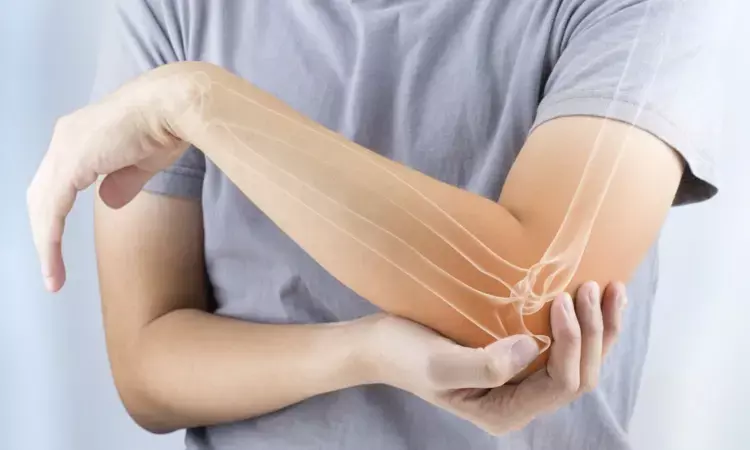- Home
- Medical news & Guidelines
- Anesthesiology
- Cardiology and CTVS
- Critical Care
- Dentistry
- Dermatology
- Diabetes and Endocrinology
- ENT
- Gastroenterology
- Medicine
- Nephrology
- Neurology
- Obstretics-Gynaecology
- Oncology
- Ophthalmology
- Orthopaedics
- Pediatrics-Neonatology
- Psychiatry
- Pulmonology
- Radiology
- Surgery
- Urology
- Laboratory Medicine
- Diet
- Nursing
- Paramedical
- Physiotherapy
- Health news
- Fact Check
- Bone Health Fact Check
- Brain Health Fact Check
- Cancer Related Fact Check
- Child Care Fact Check
- Dental and oral health fact check
- Diabetes and metabolic health fact check
- Diet and Nutrition Fact Check
- Eye and ENT Care Fact Check
- Fitness fact check
- Gut health fact check
- Heart health fact check
- Kidney health fact check
- Medical education fact check
- Men's health fact check
- Respiratory fact check
- Skin and hair care fact check
- Vaccine and Immunization fact check
- Women's health fact check
- AYUSH
- State News
- Andaman and Nicobar Islands
- Andhra Pradesh
- Arunachal Pradesh
- Assam
- Bihar
- Chandigarh
- Chattisgarh
- Dadra and Nagar Haveli
- Daman and Diu
- Delhi
- Goa
- Gujarat
- Haryana
- Himachal Pradesh
- Jammu & Kashmir
- Jharkhand
- Karnataka
- Kerala
- Ladakh
- Lakshadweep
- Madhya Pradesh
- Maharashtra
- Manipur
- Meghalaya
- Mizoram
- Nagaland
- Odisha
- Puducherry
- Punjab
- Rajasthan
- Sikkim
- Tamil Nadu
- Telangana
- Tripura
- Uttar Pradesh
- Uttrakhand
- West Bengal
- Medical Education
- Industry
Gut microbiome linked to bone density and skeletal health

There is growing evidence that a relative abundance of certain gut microbes may be related to skeletal health, according to a new study published in Frontiers in Endocrinology. If confirmed by additional research, the findings could provide the opportunity to alter gut microbiomes to achieve better bone health, as scientists learn more about “osteomicrobiology,” a new term recently used to characterize this relationship.
Due to the lack of large-scale human studies of the gut microbiome and skeletal health, researchers led by Paul C. Okoro, Data Scientist II at Hebrew SeniorLife and Hinda and Arthur Marcus Institute for Aging Research, and principal investigator Douglas P. Kiel, M.D., M.P.H., Senior Scientist at the Marcus Institute, conducted an observational study based on the Framingham Third Generation Study of men and women, and the Osteoporotic fractures in Men (MrOS) study of older men to determine whether they could find a potentially modifiable factor contributing to skeletal health. The study used high-resolution imaging of the arm and leg.
This is significant because low bone density increases the risk of developing osteoporosis, affecting more than 10 million Americans over the age of 50, and can increase the risk of fractures.
Entitled “A Two-Cohort Study on the Association between the Gut Microbiota and Bone Density, Microarchitecture, and Strength,” the study found that bacteria called Akkermansia, which has been associated with obesity, and Clostridiales bacterium DTU089, had negative associations with bone health for older adults. DTU089, a bacterium from the class, Clostridia, has been described to be more abundant in people with lower physical activity, and lower protein intake, and could be significant because prior studies have found protein intake and physical activity have a definite connection to skeletal health.
“We found patterns in which greater abundance of microbiota were associated with worse measures of bone density and microarchitecture. In fact, some bacteria were associated with differences in the bone cross sectional area, suggesting the possibility that certain microbes could influence how the bone changes size with aging,” said Dr. Kiel. “It is premature to know if the bacterial organisms themselves may have effects on skeletal health. With additional studies we might be able to gain insights regarding associations between specific bacterial species in the intestine and skeletal integrity. We also hope to identify specific functional pathways influenced by the bacteria that could influence the skeleton. For example, some bacteria can lead to low levels of inflammation that may affect bone health. Ultimately, if findings like this are confirmed, we may be able to target the gut microbiome to influence skeletal health.”
Reference:
Paul C. Okoro, Eric S. Orwoll, Curtis Huttenhower, Xochitl Morgan, Thomas M. Kuntz, Lauren J. McIver, Alyssa B. Dufour, Mary L. Bouxsein, Lisa Langsetmo10, Samaneh Farsijani, Deborah M. Kado, Roberto Pacifici, Shivani Sahni, A two-cohort study on the association between the gut microbiota and bone density, microarchitecture, and strength, https://doi.org/10.3389/fendo.2023.1237727
Dr Kamal Kant Kohli-MBBS, DTCD- a chest specialist with more than 30 years of practice and a flair for writing clinical articles, Dr Kamal Kant Kohli joined Medical Dialogues as a Chief Editor of Medical News. Besides writing articles, as an editor, he proofreads and verifies all the medical content published on Medical Dialogues including those coming from journals, studies,medical conferences,guidelines etc. Email: drkohli@medicaldialogues.in. Contact no. 011-43720751


